

Visa Requirements for Croatia

Part of the EU since July 2013 and the Schengen Zone as of 1st January 2023, visa requirements for Croatia are in line with the rest of these unions. Read on below for the current visa regulations.
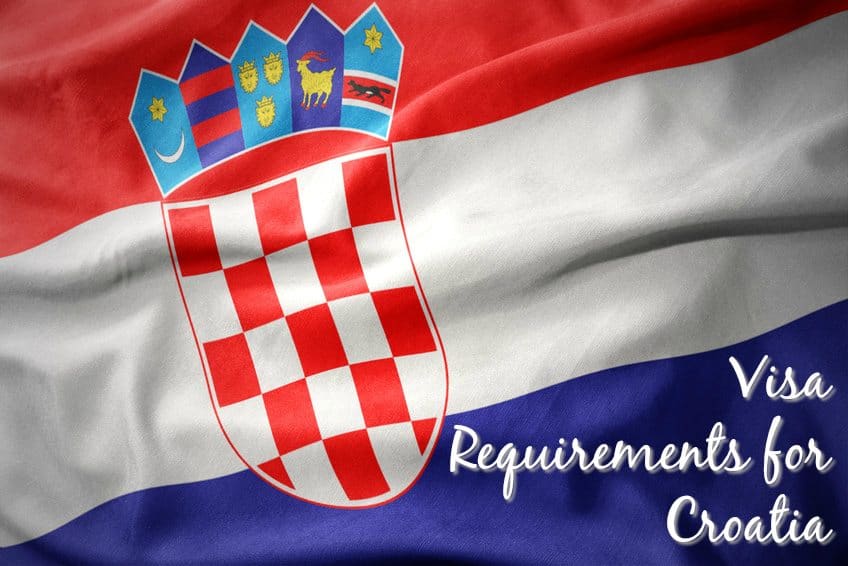
General Visa Requirements for Croatia
As of 1st January 2023, Croatia is part of the Schengen Zone, and visa requirements for Croatia fall in line with the rest of the Zone.
Many foreign visitors do not require visas to enter the Schengen Zone; citizens of the U.K., EU countries, the U.S., Canada, Australia and New Zealand do not need visas to visit Croatia or the rest of the Schengen Zone. Visitors can visit Croatia/the Schengen Zone for up to and including 90 days in any 180-day period. This means that should you stay in Croatia/the Schengen Zone for 90 days, you must then leave the Zone for another 90 days before you can return again.
For other countries, please check the Croatian Ministry of Foreign Affairs ‘ website (or a similar website for another Schengen Area country) for visa requirements for Croatia/the Schengen Zone.
You can apply for a Schengen visa from a Croatian Embassy/Consular Department in your own country, or from the Embassy of another Schengen Area country. However, if you are planning on travelling around the Schengen Zone, you should apply for a Schengen visa from the country where you spend the longest stay.
There is a list of Embassies on the Ministry of Foreign Affairs’ website. This list will also tell you which Embassy to contact if there is no Croatian Embassy in your home country; the site will also tell you if there is a visa centre in your country. We also have a list of some of the Croatian Embassies around the world.
UK residents may like to take a look at the Croatian Embassy in London’s mvep.gov.hr/uk/en .
From 2024, a new visa waiver scheme will come into play – ETIAS. Travellers who do not require a visa to Croatia will need to obtain an ETIAS before travelling to the EU. Find out more: ETIAS and Croatia .
Length of Stay in Croatia
We’ve already stated this above, but we’ll reiterate it because it is important – non-EU visitors can visit Croatia/the Schengen Zone for up to and including 90 days in any 180-day period . You may not necessarily be staying a full 90 days in one go, perhaps 7 days one month, 20 days another month, another 7 days in a third month…
Altogether, this must not exceed 90 days in any one 180-day period. The European Commission have a short-stay visa calculator to help you calculate how long you’ve stayed in the Schengen Zone.
Now that Croatia is in the Schengen Zone, visitors can no longer use the country as a place to stay whilst ‘resetting’ their Schengen day limit!
Validity of Croatian visas issued before 31st December 2022
If you are in possession of a valid Croatian visa issued before this date, you will be able to use it to visit Croatia. However, you cannot use it to visit other countries in the Schengen Zone.
Is Croatia in the Schengen Zone?
As of 1st January 2023, yes!

Land and sea border controls with the rest of the Schengen Zone have been abolished from that date, whilst at airports, controls were removed on 26th March 2023.
Entering Croatia with an ID card
Citizens of EU countries may enter Croatia using their national identity cards (if these exist) instead of a passport. Otherwise, passports are required to enter Croatia.
Visa Requirements for Croatia after Brexit
British citizens do not need a visa to visit Croatia. However, a new visa waiver scheme – ETIAS – is set to be introduced in 2024. British travellers will be required to obtain this visa waiver prior to travel to Croatia (and anywhere else in the EU). This is expected to cost €7 and you will be able to apply for this online. Each approval will last for three years.
As mentioned above, UK visitors are allowed to spend a maximum of 90 days in any 180-day period in Croatia.
More info on the effects of Brexit on British travellers can be found here: Visiting Croatia after Brexit .
Working in Croatia
As we’re a travel website, we don’t really cover long-term and work visas for Croatia. However, for information on long-term visas please see these pages on the Ministry of Foreign Affairs website – Stay of Foreigners – and the Ministry of the Interior website: Stay & Work .
If you are a British citizen, you may find the following Foreign Office helpful: Travel to Croatia for Work .
More on Visit Croatia
About Visit Croatia
Contact Visit Croatia
Buy us a coffee!
Cookie Policy
Privacy Policy
Updated daily
New & Updated on Visit Croatia
Two Days in Zagreb Slano Museums in Dubrovnik How to do Croatia on a Budget Labin Two Days in Split Nin Campsites in Croatia Shopping in Zagreb City Break in Croatia Slavonski Brod Two Days in Pula Family Holidays in Croatia 15 Things You May Not Know About Croatia Two Days in Zadar Koprivnica
Useful information on Croatia
Money in Croatia Visa Requirements for Croatia Buses in Croatia Ferries in Croatia Top Ten Destinations in Croatia Map of Croatia About Croatia
Do you need a visa to visit Croatia?

Mar 14, 2024 • 4 min read

Croatia has kept its visa system fairly easy to navigate © Littleaom / Shutterstock
Croatia is an endlessly appealing destination with sun-drenched beaches , picturesque hilltop towns and atmospheric streets.
Many come for the Dalmatian Coast delights and Istria's rural charms. Others are here for superb hiking routes , treasured national parks , food and drink experiences , or the chance to enjoy hip Zagreb's art, music and cafes.
Thankfully, the government has ensured the country is a breeze to enter for most visitors. Croatia joined the European Union (EU) in 2013 and became part of the free-traveling Schengen Area in January 2023. That means visitors from much of Europe have basically no bureaucracy to deal with.
Travelers from further afield have a few hoops to jump through. For most there's no need for a specific visa to enter Croatia, just yet. From mid-2025 the ETIAS (European Travel Information and Authorisation System) comes into effect.
Here’s our guide to Croatia’s entry requirements, with everything you need to know about whether you need a visa, how to get one and whether you can take a working holiday in Croatia.

Do I need a visa for Croatia?
EU citizens don’t need a visa for stays of any length, they don’t even need a passport providing they have an ID card. The same applies to members of the European Free Trade Association (EFTA): Iceland, Liechtenstein, Norway and Switzerland, that means you.
Many other nations don’t need visas either, but from mid-2025 visitors to Croatia (and most of Europe) will need to apply for the ETIAS travel authorisation before departing. This applies to nearby countries like the UK, Serbia, Montenegro, Kosovo, Bosnia and North Macedonia, as well as people from Canada, the US, most of Latin America, Australia, New Zealand and several Asian nations, including Japan, South Korea and Taiwan.
How often do I need to get an ETIAS?
The ETIAS lasts for three years and costs €7. With it you can enter the territory of 30 European countries as often as you want for short-term stays (normally for 90 days in any 180-day period). You also need a passport that's valid for at least three months after the date you plan to leave. The application is expected to be approved in hours but it's always best to apply ahead of time in case there is any bureaucratic hold-up.

How do I apply for a Croatian tourist visa?
Of course, not every nationality is able to travel to Croatia visa-free. Everyone else – including citizens of China , India , Pakistan , Russia , Turkey and South Africa , will need visas to enter the country. For a complete list, check the website of Croatia’s Ministry of Foreign and European Affairs – you can use the drop-down to find individual nations.
The site has details for individual countries’ requirements and embassy locations. Most pages also link to the relevant VFS Visa Application Centre page, where you can find out costs (visas are usually €80 plus fees for applicants ages 12 and older, €40 for children aged between six and twelve, and no charge for kids under six), and start the application process.
Applications for tourist or business visas (both of which are valid for 90 days) should be started online, although they may eventually need to be submitted in person at an embassy, consulate or VFS Visa Application Centre. You’re recommended to start an application no more than three months before your trip starts.
Visas may sometimes be issued at the border, but this is only under exceptional circumstances and is unlikely to be worth the risk of being turned away.
You can bring in a vehicle if your paperwork is satisfactory, and the normal EU rules apply when bringing animal products into the country.
Can I extend a Croatian visa?
Citizens of the EU and EFTA, as well as Swiss nationals, can stay as long as they like. Citizens of other countries – whether they’re traveling visa-free, on a tourist visa or on a business visa – can only spend 90 days in the country over a 180-day period. There are a few exceptions:
- visas may be extended for serious personal circumstances ;
- longer stays may be possible for people who take seasonal employment or study in the country;
- workers who intend to settle in Croatia may apply for residency.

Can I work in Croatia?
If you’re from the EU or EFTA (or you’re Swiss), you can work in Croatia.
People from outside the EU may be able to work in Croatia. Still, you’ll need to be supported by your employer and meet the requirements of the Croatian Employment Service – essentially proving you’re filling a gap in the Croatian workforce. Highly qualified workers who intend to make their home in Croatia may qualify for an EU Blue Card .
The rules are more relaxed for seasonal employment in agriculture, forestry, catering and tourism, where a job offer alone may be enough for a 90-day stay.

You may be eligible for a digital nomad visa in Croatia
Keen to swap your normal working environment for a Zagreb cafe or an apartment overlooking the Adriatic? Digital nomads working for themselves or a non-Croatian company may be able to stay for up to a year if they meet the application form requirements.
This article was first published June 2021 and updated March 2024
Explore related stories

Budget Travel
Mar 17, 2024 • 7 min read
Take the bus. Visit off season. Eat up at local bakeries. We’ve rounded up these and more tips for making your euro go further on your next Croatia trip.

Mar 15, 2024 • 10 min read

Mar 2, 2024 • 8 min read

Jan 17, 2024 • 8 min read

Aug 30, 2023 • 6 min read

Aug 4, 2023 • 11 min read

Jul 6, 2023 • 7 min read

Apr 15, 2023 • 7 min read

Mar 22, 2023 • 8 min read
GET A QUOTE
How can I get a Schengen visa for Croatia?
Croatia is one of the most culturally diverse, historically rich, and naturally stunning countries in Eastern Europe. As such, it has been attracting more and more travelers from around the world in recent years. And if you too are planning a trip to “the land of a thousand islands,” you might need a Schengen visa . Fortunately, AXA’s here to help.
- Do I need a Schengen visa to visit Croatia?
- When and where do I apply for a Type C Schengen visa to Croatia?
- How much does a Schengen visa for Croatia cost?
- What documents do I need to apply for a Schengen visa for Croatia?
- Do I need travel insurance when applying for a Schengen Visa?
- Why choose AXA Schengen Travel Insurance?
- COVID restrictions for entering Croatia
Do I need a Schengen visa to visit Croatia?
Croatia has been one of the 27 members of the European Union since 2013. And on January 1, 2023, the republic also became the official 27th member of the Schengen area . So today, if you aren’t a national of the Schengen area and/or the EU, you might need to have a Schengen visa to enter the country.
Who are the travelers who do not need a Schengen visa to come to Croatia (stay less than 90 days)?
1. Nationals of the Schengen area and/or European Union member countries.
2. Nationals of roughly 60 non-EU countries and territories that have signed visa exemption agreements with the EU . The more popular ones among them are Australia, Brazil, Canada, Hong Kong, Japan, Macao, Mexico, Taiwan, the U.K., and the U.S. Citizens of these countries may, therefore, be able to travel to Croatia visa-free for short stays. They will only be required to present a biometric passport issued no more than 10 years prior to (and valid for at least 90 days after) the planned date of departure from the Schengen zone .
NOTE: Starting in 2024, nationals of countries exempt from Schengen visas will be required to apply online for travel authorization to come to Europe. They will thus have to fill out an ETIAS form (through the European Information and Authorization System).
3. Travelers who already have a visa issued by one of the member countries of the Schengen area. Under the condition that their stay in the Schengen area does not exceed 90 days per period of 180 days
Which travelers are required to apply for a visa to Croatia?
Nationals of third countries that have not signed a visa waiver agreement with the European Union (including several countries from the Maghreb, Africa, Asia, the Middle East, Russia, India, and so on). These citizens are required to apply for a Schengen visa to enter Croatia.
The most common Schengen visa for Croatia is the short-stay (or Type C) visa. It allows you to travel to and between all 27 Schengen countries — for up to 90 days — in any 180-day period from the date of entry into the Schengen zone. And if you plan to be in Croatia (and/or the Schengen zone ) for more than 3 months, then you’ll need to apply for a national visa (or Type D visa ).
To find out if you need a Schengen visa for Croatia , we invite you to consult the list of countries for which a Schengen visa is mandatory or not . You can also learn more about what kind of Schengen visa best suits your travel needs here .
When and where do I apply for a Type C Schengen visa to Croatia?
Your visa application should be submitted no earlier than 3 months — and no later than 2 to 3 weeks — before your departure date. You can file your application at the Croatian embassy or consulate (or with a service provider such as VFS Global ) in your country of residence. . After making an appointment, you will be asked to submit your application in person. During this interview, your biometric data (fingerprints and scanned photo) will be collected and you will pay the visa application fee.
How much does a Schengen visa for Croatia cost?
A Schengen visa for Croatia will cost €80 (as the standard Schengen visa fee is universal). For children between the ages of six and twelve, the fee is €40. And children under the age can get a Schengen visa for free.
What documents do I need to apply for a Schengen visa for Croatia?
The documents required vary depending on your nationality, your country of origin, and the purpose of your trip. You should, therefore, double-check with the corresponding Croatian consulate, embassy, and/or visa application center to make sure you don’t miss anything. Meanwhile, here’s an overview of the documents generally required.
- Your passport (issued within the last 10 years, with a validity of more than 3 months after the planned date of exit from the Schengen area, and with two blank pages)
- A photocopy of the first page of your passport, as well as all pages with visas and entry and exit stamps from the Schengen area
- Residence permit (and/or resident card, if applicable)
- A short-stay Schengen visa application form* (duly completed and signed). *You can find this on the website of the Croatian representative of the country where you live and/or on the website of the corresponding service provider in charge of collecting visa applications. Alternatively, you can also fill it out online on the Croatian government's official website .
- Two recent passport photos (always in color and with a white or light gray background)
- Your itinerary (i.e., proof of reservation of the round-trip ticket)
- Proof of the purpose of the trip (i.e., a letter of invitation and guarantee (authenticated) for a private visit (family/friends) and/or for a business trip)
- Proof of accommodation in Croatia (hotel reservation, rental agreement, etc.)
- Financial documents (salary slips, bank statements, etc.) proving you can support yourself during your stay in Croatia
- Proof of socio-economic and professional stability (in order to prove the applicant's willingness to leave the Schengen area before the expiry of the requested visa)
- *NOTE: Travel insurance is mandatory and must meet several criteria in order to be accepted with your visa application (more on that below)
- Certified parental or guardian authorization for minors
To learn more about visas in the Republic of Croatia — as well as the addresses/contact info of Croatian embassies and consulates around the world — visit the website of the Ministry of Foreign and European Affairs of the Republic of Croatia .
Do I need travel insurance when applying for a Schengen Visa to Croatia?
Yes. As stated above, you will need travel insurance to be granted a Schengen visa — be it to Croatia or any of the other 26 Schengen states.
Your plan must have a minimum coverage of €30,000 in case of medical care, hospitalization, and/or medical repatriation . It must also be accepted by all 27 countries within the Schengen zone (i.e., not just Croatia). And it must be valid for the entire duration of the visa's validity.
Why choose AXA Schengen Travel Insurance?
AXA’s Schengen travel insurance plans are a sure way to make your Schengen visa application a lot more stress-free and bring you one big step closer to your Croatian trip. Here’s why:
- Not only do all three AXA plans (i.e., Low-Cost, Europe Travel , and Multi-Trip ) meet the necessary requirements for obtaining a Schengen Visa for Croatia — they also cover you in all 27 Schengen territories (and beyond).
- Once you’ve purchased your plan, you can download (and/or print) the necessary travel insurance certificate instantly.
- AXA’s travel insurance certificate is accepted at all Schengen embassies and consulates .
- Choosing an AXA travel insurance plan is also quick, easy, and affordable — it can all be done online and in a matter of minutes.
- There are also no age restrictions with AXA’s plans.
- AXA’s plans are refundable in most cases if your Schengen visa for Croatia is denied ). We’ll only ask that you provide the appropriate documentation (i.e., an official explanation as to why your visa was refused by the relevant embassy, consulate, or visa application center).
Other Schengen countries you might be interested in
Covid restrictions for entering croatia.
Since the terms and conditions are likely to change as the COVID health situation evolves, we advise that you consult the website of the Croatian embassy of your country of residence to know what restrictions apply at the time of your departure.
You can also consult the information published on Re-Open EU (the official website of the European Union) — as it regularly updates the measures for each country of the EU and the Schengen area.
Related Articles
- Travel Insurance for Croatia
- Who needs to apply for a Schengen Visa?
- How to apply for a Schengen Visa (in general).
- What are the different types of Schengen visas?
- How to fill out a Schengen visa application form
Is Croatia a member of the Schengen zone?
Yes. As of January 1, 2023, Croatia is the official 27th member state of the Schengen area.
Do I need a visa to go to Croatia?
If you’re a citizen of a Schengen country and/or the EU, you do not. Certain non-Schengen and non-EU citizens whose governments have a visa waiver agreement with the EU do not need a visa to enter Croatia either — as long as their stay does not exceed 90 days. However, citizens of over 60 non-Schengen and non-EU countries are required to have a visa to enter Croatia, even if for a short period of time.
Where can I apply for a Schengen visa for Croatia?
You should apply for a Schengen visa for Croatia at the Croatian consular authorities, embassies, and/or visa application centers in your country of residence. You can find the necessary info about Croatian embassies/consulates on the website of the Ministry of Foreign and European Affairs of the Republic of Croatia.
How much does a short-stay visa for Croatia cost for a child?
For children over 12 years old, the cost of a Type C visa (less than 90 days) is the same as for adults — i.e., €80. For children between 6 and 12 years old it is €40. And for children under the age of 6, the visa is free.
Get Schengen insurance
Copyright AXA Assistance 2023 © AXA Assistance is represented by INTER PARTNER ASSISTANCE SA/NV, a public limited liability company governed by Belgian law with registered office at Regentlaan 7, 1000 Brussel, Belgium – Insurance company authorized by the National Bank of Belgium under number 0487 and registered with the Crossroads Bank for Enterprises under number 0415 591 055 – RPR Brussels- VAT BE0415 591 055
AXA Travel Insurance Global | AXA Assicurazione Viaggio | AXA Assurance Voyage | AXA Seguros y asistencia en viajes | AXA Seguro de viagem
- Destinations
- Hotels & Homestays
- Food & Drink
- People & Culture
- Mindful Travel
- Readers' Travel Awards
- Escape to Rajasthan
- READERS TRAVEL AWARDS
- #LOVEGREATBRITAIN
- TAJ SAFARIS
- BOUTIQUE HOTELS
- CNT TOP RESTAURANT AWARDS
- DESTINATION WEDDING GUIDE
- DON’T TRAVEL WITHOUT IT
- #UNDISCOVERAUSTRALIA
- ESSENTIALLY RAJASTHAN
You can travel to Croatia on a Schengen visa from 2023
By Toshita Sahni

Croatia seems to have it all: untouched islands, historical grandeur, charming cafes and mesmerising landscapes (some of which were famously featured in Game of Thrones). The good news is that, beginning 2023, if you hold a Schengen visa, you can visit this stunning destination without having to go through border checks and without applying for a country-specific visa .
Although Croatia has been an EU member since 2013, the Council of the European Union only recently granted approval for Croatia to become a member of the Schengen Zone. According to authorities , “From 1 January 2023, checks on persons at internal land and sea borders between Croatia and the other countries in the Schengen area will be lifted. Checks at internal air borders will be lifted from 26 March 2023.” Indian citizens were earlier required to apply for Croatia visa via VFS. The processing time was around 15 days and it costed 715 kuna (Rs7,928).
A Schengen visa allows a person to stay in the Schengen area for up to 90 days over a period of 180 days. During that period, a person is free to visit whichever member countries that fall in the region. Most of the Schengen countries share land borders, thus making travel between member states even more convenient. Hungary and Slovenia, themselves part of the Schengen Zone, share land borders with Croatia. The newest member also shares a sea border with Italy.
Croatia is the 27th country to be admitted into Schengen, which is considered to be the world’s largest free travel zone, facilitating movement over an area of 4 million square kilometres. The other 26 Schengen countries include 22 of the 27 EU member states, as well as Norway, Switzerland, Iceland and Liechtenstein (who are members of the European Free Trade Association).
All products are independently selected by our editors. If you buy something, we may earn an affiliate commission.
Cookies on GOV.UK
We use some essential cookies to make this website work.
We’d like to set additional cookies to understand how you use GOV.UK, remember your settings and improve government services.
We also use cookies set by other sites to help us deliver content from their services.
You have accepted additional cookies. You can change your cookie settings at any time.
You have rejected additional cookies. You can change your cookie settings at any time.
- Passports, travel and living abroad
- Travel abroad
- Foreign travel advice
Entry requirements
This advice reflects the UK government’s understanding of current rules for people travelling on a full ‘British citizen’ passport from the UK, for the most common types of travel.
The authorities in Croatia set and enforce entry rules. If you’re not sure how these requirements apply to you, contact the Croatian Embassy in London .
COVID-19 rules
There are no COVID-19 testing or vaccination requirements for travellers entering Croatia.
Passport validity requirements
To travel to Croatia, you must follow the Schengen area passport requirements.
To enter Croatia (and all Schengen countries) your passport must:
- have a ‘date of issue’ less than 10 years before the date you arrive. Passports issued after 1 October 2018 are now valid for only 10 years, but for passports issued before 1 October 2018, extra months may have been added if you renewed a passport early
- have an ‘expiry date’ at least 3 months after the day you plan to leave
Contact the Croatian embassy in the UK if your passport does not meet both these requirements.
Check with your travel provider that your passport and other travel documents meet requirements. Renew your passport if you need to.
You will be denied entry if you do not have a valid travel document, or try to use a passport that has been lost or stolen.
Checks at border control
Border checks have been introduced at Slovenia’s borders with Croatia and will be in place for 6 months. If travelling from Croatia, to Slovenia, consult our travel advice for Slovenia .
Make sure you get your passport stamped.
If you’re a visitor, your passport must be stamped when you enter or leave the Schengen area (which includes Croatia). Border guards will use passport stamps to check you haven’t overstayed the 90-day visa-free limit for stays in the Schengen area. If your passport was not stamped, border guards will presume you have overstayed the visa-free limit.
If your passport was not stamped, show evidence of when and where you entered or left the Schengen area (for example, boarding passes or tickets) and ask the border guards to add the date and location in your passport.
Read about passport stamping if you live in Croatia .
At Croatian border control, you may also need to:
- show proof of your accommodation, for example, a hotel booking confirmation or proof of address for a second home
- show proof of your travel insurance
- show a return or onward ticket
- prove that you have enough money for your stay – the amount varies depending on your accommodation
Visa requirements
You can travel without a visa to the Schengen area (including Croatia) for up to 90 days in any 180-day period. This applies if you travel:
- as a tourist
- to visit family or friends
- to attend business meetings, cultural or sports events
- for short-term studies or training
If you’re travelling to Croatia and other Schengen countries without a visa, make sure your whole visit is within the 90-day limit. Visits to Schengen countries in the 180 days before you travel count towards your 90 days.
To stay longer (to work or study, for business travel or for other reasons), you must meet the Croatian government’s entry requirements. Check which type of visa or work permit you need with the Croatian embassy in UK .
If you stay in Croatia with a residence permit or long-stay visa, this does not count towards your 90-day visa-free limit.
Vaccination requirements
At least 8 weeks before your trip, check the vaccinations and certificates you need in TravelHealthPro’s Croatia guide .
Registration with the police
Your accommodation provider must register your arrival in Croatia with the police within 48 hours. Your hotel will normally register you. If your accommodation provider is unable to do this for you, fill in and print out the form obrazac 16a . The completed form must be handed in at the police station. Alternatively you should go to the nearest police station with the owner of the accommodation to register your address in Croatia.
Customs rules
There are strict rules about goods that can be brought into and taken out of Croatia . You must declare anything that may be prohibited or subject to tax or duty.
Taking food and drink into Croatia
You cannot take meat, milk or products containing them into EU countries. There are some exceptions for medical reasons, for example certain amounts of powdered infant milk, infant food, or pet food. Check the rules about taking food and drink into the EU on the European Commission website.
Related content
Is this page useful.
- Yes this page is useful
- No this page is not useful
Help us improve GOV.UK
Don’t include personal or financial information like your National Insurance number or credit card details.
To help us improve GOV.UK, we’d like to know more about your visit today. We’ll send you a link to a feedback form. It will take only 2 minutes to fill in. Don’t worry we won’t send you spam or share your email address with anyone.
Exploring Croatia: Visa Requirements For Travelers
- Last updated Apr 12, 2024
- Difficulty Intemediate
- Category Travel
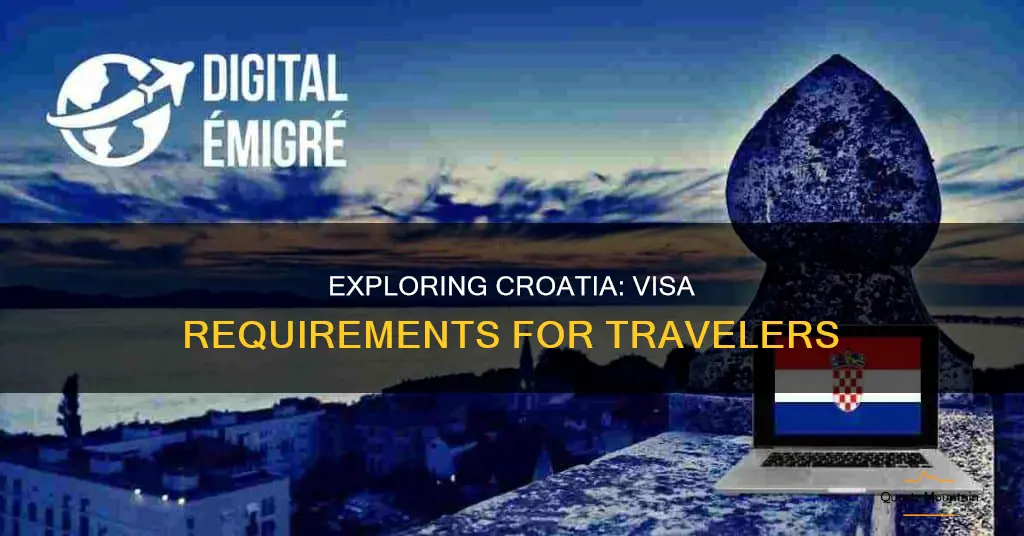
Welcome to Croatia, a stunning country known for its beautiful coastline, historical cities, and unique culture. If you're planning to visit this Balkan gem, it's essential to have a proper understanding of the visa requirements. In this guide, we'll navigate through the different visa options available for travelers and provide you with all the necessary information to make your Croatian adventure stress-free. So, grab your wanderlust spirit and join us on this insightful journey as we explore Croatia's visa requirements for travelers.
What You'll Learn
Visa exemptions for croatia, visa requirements for croatia, applying for a croatian visa, exceptions and special cases.

Croatia, with its stunning coastlines, vibrant cities, and rich cultural heritage, has become an increasingly popular tourist destination in recent years. If you're planning a trip to this beautiful country, it's important to know the visa requirements and exemptions. In this blog post, we'll guide you through the visa exemptions for different categories of travelers, including EU citizens, Schengen Area citizens, non-Schengen area citizens with Schengen visas, and United States and Canadian citizens. Let's dive in!
EU Citizens:
If you hold a valid passport issued by any of the European Union (EU) member states, you are not required to obtain a visa to enter Croatia. You can enter the country using your passport or national ID card. However, it's important to note that your passport or ID card must be valid for the duration of your stay. You can visit Croatia for tourism, business, or any other purpose without any time restrictions.
Schengen Area Citizens:
Croatia is not yet a member of the Schengen Area, but it allows travelers from Schengen Area countries to enter its territory without a visa. If you hold a valid Schengen visa, you can enter Croatia for tourism, business, or any other purpose for a maximum stay of 90 days within a 180-day period. Make sure to keep track of the number of days you spend in the country to avoid overstaying your visa.
Non-Schengen Area Citizens with Schengen Visa:
If you are a citizen of a country that is not part of the Schengen Area but holds a valid Schengen visa, you can also enter Croatia without an additional visa. You can stay in Croatia for a maximum of 90 days within a 180-day period, just like Schengen Area citizens. It's important to ensure that your Schengen visa is still valid and has enough remaining days for your visit to Croatia.
United States and Canadian Citizens:
United States and Canadian citizens can enter Croatia without a visa for tourism or business purposes for a maximum stay of 90 days within a 180-day period. Your passport should be valid for at least three months beyond your intended departure date. Upon arrival, you will need to present a valid passport, proof of accommodation, and a return ticket or proof of onward travel.
Regardless of your nationality, it's essential to have travel insurance that covers the entire duration of your stay in Croatia. Make sure to carry any necessary documents related to your purpose of visit, such as business invitations or hotel reservations.
While traveling to Croatia, always abide by the local laws and regulations. It's recommended to carry a copy of your passport or ID card with you at all times and register your presence with the local authorities if required.
Please note that visa requirements and exemptions can change over time. Therefore, it's crucial to check the latest information with the Croatian Ministry of Foreign and European Affairs or the nearest Croatian embassy or consulate before planning your trip.
In conclusion, Croatia offers visa exemptions for EU citizens, Schengen Area citizens, non-Schengen area citizens with Schengen visas, as well as United States and Canadian citizens. Make sure to check the specific requirements for your nationality and travel purpose before embarking on your Croatian adventure. Happy travels!
Exploring Paris: Navigating with an Expired US Visa
You may want to see also
Croatia is a beautiful country located in Southeastern Europe, known for its stunning coastlines, vibrant cities, and rich cultural heritage. If you are a non-EU and non-Schengen area citizen planning to visit Croatia, it is important to be aware of the visa requirements before your trip. In this guide, we will provide you with all the necessary information about the different types of visas available, including the short stay visa and the long stay visa.
Non-EU and Non-Schengen Area Citizens
If you are a non-EU and non-Schengen area citizen, you will need to obtain a visa to enter Croatia. Citizens of countries such as the United States, Canada, Australia, and many others fall into this category. The type of visa you need will depend on the purpose and duration of your stay in Croatia.
Short Stay Visa
The short stay visa, also known as the Schengen visa, is suitable for tourists and visitors planning to stay in Croatia for up to 90 days within a six-month period. This visa allows you to travel freely within the Schengen Area, which includes Croatia. To apply for a short stay visa, you will need to follow these steps:
- Check if you need a visa: Visit the website of the Ministry of Foreign and European Affairs of the Republic of Croatia to determine if you need a visa to enter Croatia.
- Gather the required documents: The following documents are usually required for a short stay visa application:
- Valid passport: Your passport must be valid for at least three months beyond the intended stay in Croatia.
- Completed visa application form: You can download the application form from the nearest Croatian embassy or consulate's website.
- Proof of accommodation: Provide a hotel reservation or a letter of invitation from a host in Croatia.
- Travel itinerary: Include your flight tickets or other proof of transportation arrangements.
- Travel medical insurance: Show proof of travel medical insurance covering the entire duration of your stay in Croatia.
- Proof of sufficient funds: Demonstrate that you have enough financial means to support yourself during your stay.
- Schedule an appointment: Contact the Croatian embassy or consulate in your home country to schedule an appointment for submitting your visa application and supporting documents.
- Attend the appointment: On the scheduled date, visit the embassy or consulate to submit your application and provide your biometric data, including fingerprints.
- Pay the visa fee: Pay the visa fee, which may vary depending on your nationality and the type of visa you are applying for.
- Wait for the decision: The processing time for a short stay visa application can take several weeks. Be sure to apply well in advance of your intended travel dates.
Long Stay Visa
If you plan to stay in Croatia for more than 90 days or engage in activities such as employment, study, or family reunification, you will need to apply for a long stay visa. Here are the steps to apply for a long stay visa:
- Determine the type of visa: Depending on the purpose of your stay, you will need to apply for a specific type of long stay visa. These include work visas, student visas, family reunion visas, and others.
- Gather the required documents: The documents needed for a long stay visa are often more extensive than those for a short stay visa. They may include proof of accommodation, proof of sufficient funds, proof of health insurance, a detailed study or work plan, and other supporting documents.
- Schedule an appointment: Contact the nearest Croatian embassy or consulate to schedule an appointment for submitting your visa application and supporting documents.
- Attend the appointment: Visit the embassy or consulate on the scheduled date to submit your application and provide the necessary documents and biometric data.
- Pay the visa fee: Pay the applicable visa fee at the embassy or consulate.
- Wait for the decision: The processing time for a long stay visa application can be longer than that for a short stay visa. Be prepared to wait for several weeks or even months for a decision.
Remember to start the visa application process well in advance of your intended travel dates to account for the time it takes to gather the necessary documents and receive a decision on your application.
We hope this comprehensive guide has provided you with all the information you need about the visa requirements for Croatia, including the short stay visa and the long stay visa. By following the steps outlined above and ensuring that you have all the required documents, you can make your visit to Croatia a hassle-free and memorable experience. Safe travels!
Exploring the World: Discover the Possibilities of Travel on a Student Visa
Required Documents:
- Passport: Your passport must be valid for at least three months beyond your planned stay in Croatia. Make sure it has at least two blank pages for visa stamps.
- Visa Application Form: Fill out the visa application form accurately and completely. You can download the form from the official website of the Croatian Ministry of Foreign and European Affairs.
- Photo: Attach one recent passport-sized photo (3.5 cm x 4.5 cm) to your application form. The photo should be in color with a clear background and taken within the last six months.
- Travel Health Insurance: Obtain valid travel health insurance that covers the entire duration of your stay in Croatia. The insurance should have a minimum coverage of 30,000 Euros and should cover any medical emergencies, hospitalization, and repatriation.
- Flight Itinerary: Provide a copy of your flight itinerary showing your entry and exit dates from Croatia. Make sure your travel dates align with the validity of your visa.
- Proof of Accommodation: Submit proof of accommodation for your entire stay in Croatia. This can be hotel reservations, a letter of invitation from a Croatian host, or rental agreement if you're staying in a private accommodation.
- Proof of Sufficient Funds: Show evidence of sufficient financial means to cover your stay in Croatia. This can include bank statements from the past three to six months, credit card statements, or a letter from your employer stating your financial position.
Application Process:
- Schedule an Appointment: Visit the website of the Croatian Embassy or Consulate in your country to schedule an appointment for submitting your visa application. Walk-in applications are generally not accepted.
- Gather Required Documents: Collect all the required documents mentioned above. Make sure to have both original and photocopies of each document.
- Attend the Appointment: Arrive at the embassy or consulate on time with all your documents. Present your application form, photos, and supporting documents to the visa officer. They may ask you some questions about your purpose of travel, so be prepared to answer them.
- Pay the Visa Fee: Pay the visa fee at the embassy or consulate. The fee varies depending on the type of visa you are applying for and your nationality. It is non-refundable, even if your visa application is denied.
- Track Your Application: After submitting your application, you will receive a receipt with a unique tracking number. Use this number to track the status of your application on the embassy or consulate's website.
The visa fee for a Croatian visa varies depending on the type and duration of the visa, as well as your nationality. It is important to check the exact fee applicable to your situation before attending your appointment. The fee must be paid in the local currency or as specified by the embassy or consulate, and it is non-refundable.
In conclusion, applying for a Croatian visa requires careful attention to detail and the timely submission of all required documents. By following the instructions provided and being prepared, you can increase your chances of obtaining a visa and have a successful trip to beautiful Croatia.
How to Travel to South Korea Without a Visa
Croatia is a beautiful country that is becoming increasingly popular among foreigners. Whether you are planning to work, study, or reunite with your family in Croatia, it is important to understand the specific visa requirements and regulations. In this article, we will provide detailed information on the Croatian visa for employment, study, and family reunification.
Croatian Visa for Employment:
If you are planning to work in Croatia, you will need to obtain a Croatian employment visa. Here are the steps you need to follow:
- Job Offer: First and foremost, you need to secure a job offer from a Croatian employer. This job offer should include important details such as your job description, salary, and employment duration.
- Work Permit: Once you have a job offer, your Croatian employer should apply for a work permit on your behalf. They will need to provide supporting documents such as their business registration, proof of their financial stability, and proof that they have made efforts to hire Croatian citizens first.
- Visa Application: Once your work permit has been approved, you can apply for a Croatian employment visa. You will need to visit the nearest Croatian embassy or consulate in your home country to submit your application. Make sure to bring all the required documents, such as your passport, job offer, work permit, proof of accommodation, and proof of financial stability.
- Residence Permit: After you have obtained your Croatian employment visa, you will need to apply for a residence permit within 30 days of your arrival in Croatia. This can be done at the local police station or the relevant administrative office. You will need to provide additional documents such as proof of health insurance and a clean criminal record.
Croatian Visa for Study:
If you plan to study in Croatia, you will need to apply for a Croatian student visa. Here's what you need to do:
- Letter of Acceptance: First, you need to apply and get accepted into a recognized Croatian educational institution. Once you have been accepted, the institution will provide you with a letter of acceptance.
- Visa Application: With the letter of acceptance in hand, you can apply for a Croatian student visa. The application process is similar to the employment visa process mentioned above. Make sure to submit all the required documents, including your passport, letter of acceptance, financial proof, and proof of accommodation.
- Residence Permit: Once you arrive in Croatia, you will need to apply for a student residence permit within 30 days of your arrival. This can be done at the local police station or the relevant administrative office. You will need to provide additional documents such as proof of health insurance and proof of sufficient funds to cover your study and living expenses.
Croatian Visa for Family Reunification:
If you are planning to reunite with your family member(s) who are Croatian citizens or have a residence permit in Croatia, you can apply for a Croatian family reunification visa. Here's what you need to know:
- Relationship Proof: You will need to prove your relationship with the family member(s) you are planning to join in Croatia. This can be done through marriage certificates, birth certificates, or other relevant documents.
- Visa Application: Once you have the necessary relationship proof, you can apply for a Croatian family reunification visa. The application process is similar to the other visa types mentioned above. Make sure to provide all the required documents, including your passport, relationship proof, proof of accommodation, and proof of financial stability.
- Residence Permit: Once you arrive in Croatia, you will need to apply for a family reunification residence permit within 30 days of your arrival. This can be done at the local police station or the relevant administrative office. You will need to provide additional documents such as proof of health insurance and a clean criminal record.
Remember, it is important to start the visa application process well in advance to avoid any delays or complications. Additionally, always consult the official websites of the Croatian government or contact the nearest Croatian embassy or consulate for the most up-to-date and accurate information regarding visa requirements and regulations for employment, study, and family reunification.
Exploring Exciting International Destinations: Can You Travel Outside of China with a Z Visa?
Frequently asked questions.
No, if you are a citizen of the European Union (EU), you do not need a visa to travel to Croatia. Croatia is a member of the EU and has implemented the Schengen Agreement, allowing for freedom of movement within the EU. However, if you are a citizen of a non-EU country, you may need to obtain a visa before traveling to Croatia.
If you are an EU citizen, you can stay in Croatia for an unlimited period of time without a visa. You are entitled to the same rights and benefits as Croatian citizens, including the right to work and study. Non-EU citizens who do not require a visa can stay in Croatia for up to 90 days within a 180-day period.
Yes, there are some exceptions to the visa requirement for non-EU citizens. Citizens of certain countries, such as the United States, Canada, Australia, and Japan, do not need a visa to enter Croatia for tourism, business, or other short-term purposes. However, it is recommended to check with the Croatian embassy or consulate in your home country to confirm the visa requirements.
If you are a non-EU citizen and require a visa to travel to Croatia, you will need to apply at the nearest Croatian embassy or consulate in your home country. The application process typically involves submitting a completed visa application form, a valid passport, supporting documents such as proof of accommodation, travel itinerary, proof of sufficient funds, and a visa fee. The visa application process can take several weeks, so it is advisable to apply well in advance of your planned trip.

- Steffi Montoya Author Traveller

- Pop Panupong Author Reviewer Traveller
It is awesome. Thank you for your feedback!
We are sorry. Plesae let us know what went wrong?
We will update our content. Thank you for your feedback!
Leave a comment
Travel photos, related posts.
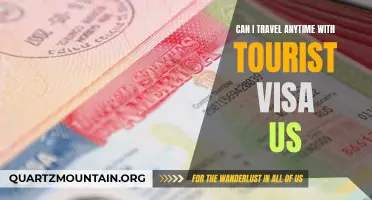
Exploring the Flexibility of Traveling with a Tourist Visa in the US
- Mar 17, 2024

Traveling with a Child on a J1 Visa: What You Need to Know
- Mar 24, 2024

Navigating International Travel with an H1B Visa: What You Need to Know
- Mar 23, 2024

Exploring the Possibility: Traveling to the US While Waiting for a K1 Visa
- Mar 22, 2024

Is It Possible to Travel to Italy with a Schengen Visa?
- Mar 21, 2024

Travel to Russia with a Schengen Visa: What You Need to Know
Travel Erudition
Can i travel to schengen countries with croatia visa?

If you have a Croatian visa, you may be able to travel to some of the Schengen countries. This is because Croatia is a part of the Schengen Agreement. The Schengen Agreement is a agreement between 26 European countries that allows for free movement of people between the member countries.
Yes, you can travel to Schengen countries with a Croatia visa.
Is Croatia visa Schengen visa?
The Schengen area is set to expand on January 1, 2023, when Croatia will become a member state. This will allow Croatian citizens to travel visa-free throughout the Schengen area. In addition, the value of the Croatian residence permit will increase, as holders will be able to travel throughout the Schengen area.
Croatia is now a member of the Schengen Area, as of January 2023. The country was already part of the European Union — Croatia applied for EU membership in 2003 and became a Member State in 2013. Countries that sign the EU Treaty of Accession are obliged to implement Schengen rules.
Can I enter Slovenia with Croatia visa

Slovenia is in the Schengen Area, which means that, in general, there are no checks at the border crossings with Italy, Austria and Hungary. To enter Slovenia from Croatia, it is sufficient to have a passport or an identity document, if the visit does not last more than three months.
Yes, you can enter the Schengen area in country X with a visa issued by Schengen country Y.
Can I travel to Europe with Croatian visa?
If you try to travel to a Schengen country with a Croatian visa, you will be turned away at the border. Croatian visas are not valid for travel to any of the Schengen countries. If you want to travel to a Schengen country, you will need to apply for a Schengen visa.
As of January 2023, Croatian passport holders can travel visa-free to 141 countries and territories: Albania, Andorra, Antigua and Barbuda, Argentina, Armenia, Australia, Austria, Azerbaijan, Bahamas, Barbados, Belarus, Belgium, Belize, Bosnia and Herzegovina, Botswana, Brazil, Brunei, Bulgaria, Canada, Chile, Colombia, Costa Rica, Cote d’Ivoire, Croatia, Cyprus, Czech Republic, Denmark, Dominica, Ecuador, El Salvador, Estonia, Finland, France, Gambia, Georgia, Germany, Greece, Grenada, Guatemala, Honduras, Hong Kong, Hungary, Iceland, Ireland, Israel, Italy, Japan, Kazakhstan, Kosovo, Kuwait, Latvia, Lebanon, Liechtenstein, Lithuania, Luxembourg, Macao, Macedonia, Malaysia, Maldives, Malta, Mauritius, Mexico, Moldova, Monaco, Montenegro, Namibia, Netherlands, New Zealand, Nicaragua, North Macedonia, Norway, Panama, Paraguay, Peru, Philippines, Poland, Portugal, Qatar, Romania, Russia, Saint Kitts and Nevis, Saint Lucia, Saint Vincent and the Grenadines, Samoa, San Marino, Senegal, Serbia, Seychelles, Singapore,
Can I enter Romania with a Croatian visa?

This is good news for those who are planning to travel to Romania! You may not need a visa if you already have a Schengen visa or a short-stay visa from Bulgaria, Croatia, or Cyprus. This means that you can stay in Romania for up to 90 days within a 180-day period without having to apply for a new visa. Remember to check the expiration dates on your visa before you travel, and make sure you have all the necessary documentation with you when you enter the country.
This arrangement applies to both business and tourist travel. However, travelers should note that this arrangement is subject to change and it is always best to check with the Montenegrin embassy or consulate before making travel plans.
Is there border Control between Croatia and Slovenia
With Croatia joining the Schengen Area, border controls have been lifted at the land border between Slovenia and Croatia. This means that there is now free flow of traffic between the two countries.
As per the Schengen visa rules, the first port of entry is usually the country that issues your visa. For example, if your port of entry is a place in Germany, you must apply to the German embassy/consulate (unless you are spending more time in another country than Germany).
Can I enter France with German Schengen visa?

A Schengen visa (issued by a Schengen State embassy or consulate) is valid for all 26 States in the Schengen area unless indicated otherwise on the visa stamp. If your visa is still valid, you do not need to apply for another visa to visit France.
Seriously though, nothing will happen if you don’t use the visa. In fact, already having successfully applied for a Schengen visa makes future applications easier.

Can I travel Europe with Malta visa
Malta is one of the countries under the Schengen agreement. With a Schengen visa you can travel to and stay in Malta and all the other 26 Schengen countries.
An island country, Malta is located in the central Mediterranean Sea. Malta has a rich history and culture, and is a popular tourist destination. Malta is also a member of the European Union.

This change will come into effect on January 1, 2021. This means that, as of that date, third country nationals who are holders of visas and residence permits of Bulgaria, Cyprus and Romania will no longer be able to enter the territory of the Republic of Croatia without a valid Schengen visa (visa type C) or Croatian national visa (visa type D).
Does Croatia count as 90 days Schengen?
The Schengen area is a group of countries that have abolished passport and visa controls at their mutual borders. This includes most of the countries in the European Union, as well as a few non-EU countries.
You can stay in the Schengen area for up to 90 days in any 180-day period. This means that if you leave the Schengen area for even one day, you can come back and stay for another 90 days.
However, this 90-day period is not cumulative. That is, it is not based on the calendar, but on days spent in the Schengen area. So, if you spend 90 days in the Schengen area, then leave for even one day, you can come back and stay for another 90 days.

The Schengen area includes the following countries:
Austria, Belgium, Czech Republic, Denmark, Estonia, Finland, France, Germany, Greece, Hungary, Iceland, Italy, Latvia, Liechtenstein, Lithuania, Luxembourg, Malta, Netherlands, Norway, Poland, Portugal, Slovakia, Slovenia, Spain, Sweden, and Switzerland.
Per the US Department of State, a visa is not required for US passport holders for temporary tourist and business trips up to 90 days (during a six-month period, starting from the day of the first entry) in the Schengen area. Time spent in any of the Schengen countries counts towards the total 90 days in Schengen. For more information, please visit the US Department of State’s website.
Yes, you can travel to Schengen countries with a Croatian visa.
Yes, you can travel to Schengen countries with a Croatia visa. Croatia is a member of the European Union and part of the Schengen Area, so Croatian visa holders can freely travel to any Schengen country. If you’re planning a trip to Europe, a Croatia visa is a great option.

Scott Johnson
Scott Johnson is passionate about traveling. He loves exploring new cultures and places, and discovering the world around him. He believes that travel can open up new perspectives and opportunities for growth and development. Scott has visited many countries in Europe, Africa, South America, and Asia, and he continues to seek out new destinations for his adventures.
Leave a Comment Cancel reply
The Economic Times daily newspaper is available online now.
Starting january 1, you can visit croatia on a schengen visa.
The world's largest free travel zone, the Schengen area comprises 26 countries — 22 EU states plus Iceland, Liechtenstein, Norway and Switzerland. Almost 1.7 million people live in one Schengen country and work in another. Around 3.5 million people cross an internal border each day.

- Germany relaxes Schengen visa appointment rules for Indians

Read More News on

For the times they are a-changin': Maruti’s mega reshuffle has more to it than meets the eye

12th pass: Meet Vishesh Khurana, the ‘college dropout’ who will lead Tribe Capital’s India foray

Finding MIMO: the adventures of Dr. Arogyaswami Paulraj — patriot, scientist, inventor, and visionary

At Suzlon, CEO Chalasani is powering profitability. But is the turnaround sustainable?

LTIMindtree: All eyes are on the next CEO, but investors need to reset expectations. Here’s why.

Much ado about localisation proof: Why the flagship PLI scheme failed to benefit auto companies
Find this comment offensive?
Choose your reason below and click on the Report button. This will alert our moderators to take action
Reason for reporting:
Your Reason has been Reported to the admin.

To post this comment you must
Log In/Connect with:
Fill in your details:
Will be displayed
Will not be displayed
Share this Comment:
Uh-oh this is an exclusive story available for selected readers only..
Worry not. You’re just a step away.

Prime Account Detected!
It seems like you're already an ETPrime member with
Login using your ET Prime credentials to enjoy all member benefits
Log out of your current logged-in account and log in again using your ET Prime credentials to enjoy all member benefits.
To read full story, subscribe to ET Prime
₹34 per week
Billed annually at ₹2499 ₹1749
Super Saver Sale - Flat 30% Off
On ET Prime Membership
Unlock this story and enjoy all members-only benefits.
Offer Exclusively For You
Save up to Rs. 700/-
ON ET PRIME MEMBERSHIP
Get 1 Year Free
With 1 and 2-Year ET prime membership
Get Flat 40% Off
Then ₹ 1749 for 1 year
ET Prime at ₹ 49 for 1 month
Stay Ahead in the New Financial Year
Get flat 20% off on ETPrime
90 Days Prime access worth Rs999 unlocked for you

Exclusive Economic Times Stories, Editorials & Expert opinion across 20+ sectors
Stock analysis. Market Research. Industry Trends on 4000+ Stocks
Get 1 Year Complimentary Subscription of TOI+ worth Rs.799/-
Stories you might be interested in
Featured on

- What is a visa?
- Electronic Visa (eVisa)
- Visa on Arrival
- Appointment Required Visa
- Invitation Letter
- Arrival Card
- Passport Renewal
- Project Kosmos: Meet the man with the world's most challenging travel schedule
- Australia Visa and ETA Requirements for US Citizens Explained
- Brazil eVisa for US Citizens
- India Tourist Visa for UK Citizens
- Possible B1/B2 Visa Questions During the Interview
Select Your Language
- Nederlandse
- 中文 (Zhōngwén), 汉语, 漢語
Select Your Currency
- AED United Arab Emirates Dirham
- AFN Afghan Afghani
- ALL Albanian Lek
- AMD Armenian Dram
- ANG Netherlands Antillean Guilder
- AOA Angolan Kwanza
- ARS Argentine Peso
- AUD Australian Dollar
- AWG Aruban Florin
- AZN Azerbaijani Manat
- BAM Bosnia-Herzegovina Convertible Mark
- BBD Barbadian Dollar
- BDT Bangladeshi Taka
- BGN Bulgarian Lev
- BIF Burundian Franc
- BMD Bermudan Dollar
- BND Brunei Dollar
- BOB Bolivian Boliviano
- BRL Brazilian Real
- BSD Bahamian Dollar
- BWP Botswanan Pula
- BZD Belize Dollar
- CAD Canadian Dollar
- CDF Congolese Franc
- CHF Swiss Franc
- CLP Chilean Peso
- CNY Chinese Yuan
- COP Colombian Peso
- CRC Costa Rican Colón
- CVE Cape Verdean Escudo
- CZK Czech Republic Koruna
- DJF Djiboutian Franc
- DKK Danish Krone
- DOP Dominican Peso
- DZD Algerian Dinar
- EGP Egyptian Pound
- ETB Ethiopian Birr
- FJD Fijian Dollar
- FKP Falkland Islands Pound
- GBP British Pound Sterling
- GEL Georgian Lari
- GIP Gibraltar Pound
- GMD Gambian Dalasi
- GNF Guinean Franc
- GTQ Guatemalan Quetzal
- GYD Guyanaese Dollar
- HKD Hong Kong Dollar
- HNL Honduran Lempira
- HTG Haitian Gourde
- HUF Hungarian Forint
- IDR Indonesian Rupiah
- ILS Israeli New Sheqel
- INR Indian Rupee
- ISK Icelandic Króna
- JMD Jamaican Dollar
- JPY Japanese Yen
- KES Kenyan Shilling
- KGS Kyrgystani Som
- KHR Cambodian Riel
- KMF Comorian Franc
- KRW South Korean Won
- KYD Cayman Islands Dollar
- KZT Kazakhstani Tenge
- LAK Laotian Kip
- LBP Lebanese Pound
- LKR Sri Lankan Rupee
- LRD Liberian Dollar
- LSL Lesotho Loti
- MAD Moroccan Dirham
- MDL Moldovan Leu
- MGA Malagasy Ariary
- MKD Macedonian Denar
- MNT Mongolian Tugrik
- MOP Macanese Pataca
- MUR Mauritian Rupee
- MVR Maldivian Rufiyaa
- MWK Malawian Kwacha
- MXN Mexican Peso
- MYR Malaysian Ringgit
- MZN Mozambican Metical
- NAD Namibian Dollar
- NGN Nigerian Naira
- NIO Nicaraguan Córdoba
- NOK Norwegian Krone
- NPR Nepalese Rupee
- NZD New Zealand Dollar
- OMR Omani Rial
- PAB Panamanian Balboa
- PEN Peruvian Nuevo Sol
- PGK Papua New Guinean Kina
- PHP Philippine Peso
- PKR Pakistani Rupee
- PLN Polish Zloty
- PYG Paraguayan Guarani
- QAR Qatari Rial
- RON Romanian Leu
- RSD Serbian Dinar
- RUB Russian Ruble
- RWF Rwandan Franc
- SAR Saudi Riyal
- SBD Solomon Islands Dollar
- SCR Seychellois Rupee
- SEK Swedish Krona
- SGD Singapore Dollar
- SHP Saint Helena Pound
- SLL Sierra Leonean Leone
- SOS Somali Shilling
- SRD Surinamese Dollar
- SVC Salvadoran Colón
- SZL Swazi Lilangeni
- THB Thai Baht
- TJS Tajikistani Somoni
- TOP Tongan Pa anga
- TRY Turkish Lira
- TTD Trinidad and Tobago Dollar
- TWD New Taiwan Dollar
- TZS Tanzanian Shilling
- UAH Ukrainian Hryvnia
- UGX Ugandan Shilling
- USD United States Dollar
- UYU Uruguayan Peso
- UZS Uzbekistan Som
- VND Vietnamese Dong
- VUV Vanuatu Vatu
- WST Samoan Tala
- XAF CFA Franc BEAC
- XCD East Caribbean Dollar
- XOF CFA Franc BCEAO
- XPF CFP Franc
- YER Yemeni Rial
- ZAR South African Rand
- ZMW Zambian Kwacha
We've updated our app!
Download it now
How to apply for the Croatia Schengen Visa
1.2M happy customers
24/7 support
+46,000 reviews
10 years of experience
98% visa approval rate
How to Apply: Schengen Visa
Complete our user-friendly online application in just 20 minutes, or feel free to take breaks and return at your convenience.
Move closer to an approved visa with our team of iVisa Experts, who not only review your answers but also provide you with the necessary tools to prepare.
Make use of our feedback and free templates to confidently submit accurate information, and experience a surprisingly stress-free process!
Once government-approved, your visa will be ready for collection, marking the start of your travels.
How to Apply: Embassy Registration
Complete our easy online application and pay with credit card or PayPal
Your embassy will assist you if an emergency (eg. Natural disasters, civil unrest, etc) occur
Why Register with the Embassy
Required information to apply.
Once You Have Registered With Your Embassy Or Consulate, You Will Need To Update Your Data If:
- your contact details change,
- your civil status changes,
- you are going back to your home country.
Learn More: Schengen Visa
What you need to know.
The Croatia Schengen visa, is a short-stay visa (visa type C), allowing you to either transit through or stay in the Schengen countries.
Your visa is valid for 90 days within 180 days. We recommend applying 15 days to 6 months before your trip, with a maximum of 9 months for seafarers.
Allowed activities include Tourism, business, visiting friends and family, medical reasons, studying, and training.
Last updated: April 2024
Planning a European adventure with Croatia on your itinerary? Now that Croatia is part of the Schengen Visa scheme, the process for non-EU citizens to visit this Adriatic gem has become more streamlined.
Start your journey with our guide on applying for a Schengen Visa and easily explore Croatia.

What is the Croatia Schengen Visa?
The Croatia Schengen Visa is your ticket to hassle-free European travel, allowing you to explore 27 Schengen member states without needing separate visas.
These countries include Croatia (of course), Austria, Belgium, Czech Republic, Denmark, Estonia, Finland, France, Germany, Greece, Hungary, Italy, Iceland, Latvia, Liechtenstein, Lithuania, Luxembourg, Malta, Netherlands, Norway, Poland, Portugal, Slovakia, Slovenia, Spain, Sweden, and Switzerland.
Your travel planning is even easier now that these countries have abolished internal border controls!
Note that to be eligible for this visa, Croatia must be the first country you enter in the Schengen Zone or where you’ll spend the most time during your trip.
What can I do with the Croatia Schengen Visa?
With this visa, you can:
- Explore this European country and the Schengen Zone as a tourist.
- Do business.
- Visit friends and family.
- Take part in short-term studies and professional training.
- Transit through the Schengen area.
What can I not do with the Croatia Schengen Visa?
Keep in mind that you can’t:
- Reside in the country or the Schengen Zone.
- Work and study for a long period.
- Reuniting family members should go through official immigration or legal procedures to live together in Croatia or the Schengen Zone.
Who is eligible to apply for the Croatia Schengen Visa?
To be eligible for a Croatia Schengen visa, you must meet the following criteria first:
Non-Schengen/EU/EEA nationality: You must be a citizen of a country that does not have visa-free travel to the Schengen Area.
Purpose of travel: You must have a clear and legitimate reason for visiting, such as tourism or business.
Intention to leave the Schengen area: You must convince the Croatian authorities that you intend to leave the Schengen area before your visa expires.
Sufficient funds: You must have enough money to support yourself during your stay.
Travel Insurance: You must have travel health insurance that covers emergency medical expenses and repatriation during your stay.
Clean record: You should not have a history of overstaying Schengen visas or have been previously deported or flagged in the Schengen Information System for any reason.
Who needs to apply for the Croatia Schengen Visa?
Most travelers from non-Schengen and non-EU countries who do not hold visa waiver status must apply for Croatia Schengen Visas, which may include a pre-departure interview.
To find out if you need a Croatia Schengen Visa, select your nationality at the top of this page.
Do minors need to apply for the Croatia Schengen Visa?
Yes, children and minors must apply for this Schengen Visa to visit Croatia if they come from an eligible country.
Parents or legal guardians must sign the application form and include the minor's birth certificate during the application process.
Who is visa-exempt for Croatia?
Travel to and within the Schengen Zone is visa-free for residents of any EU country and nationals of Schengen countries .
Additionally, nationals from the following countries can visit Croatia without a visa, according to the Schengen rules:
- United States
- United Kingdom
- New Zealand
How long is the Croatia Schengen Visa valid?
You can stay in the Schengen area for up to 90 days Per Entry within a 180-day period , with this visa. The best part is that you can hop the internal borders of Schengen countries as much as you like with one visa, as long as your total stay doesn't exceed 90 days!
The Croatian authorities ultimately determine what type of visa and what validity you receive.
If you have long-term plans to stay in Croatia or other Schengen countries , please check the Croatian government website for more details.
Can I extend my Croatia Schengen Visa?
Extending a Croatia Schengen Visa is challenging. Approvals are rare and require strong justification and supporting documentation, for example, in a medical emergency.
To find out if you can extend your Croatia Schengen Visa, contact the Croatian Immigration Service before your visa expires.
Croatia Schengen Visa: Required documents
You typically require:
Schengen Visa application form
Two recent photographs: Taken recently.
Valid passport: It must have at least 6 months validity after arrival and two blank pages for visa stickers and stamps.
Travel itinerary: Including a copy of your return flight ticket.
Proof of accommodation: You'll need a hotel confirmation or a letter from relatives in Croatia to show where you're staying during your trip.
Proof of sufficient funds: Bank statements or salary slips proving that you have the necessary funds to cover your entire trip in the Schengen Zone.
Biometric info: If you have not registered your fingerprints in the past 59 months, you’ll need to provide your biometric data during your appointment.
Medical/travel insurance: It must cover a minimum of €30,000 for emergency medical treatment and repatriation in the entire Schengen Zone and European Union.
Documents for children: When you’re applying on behalf of your child or a minor, their birth certificates and parental consent must be submitted too.
The general steps to apply are:
- Choose the Schengen visa type based on your travel purpose.
- Fill out the Schengen Visa application form accurately.
- Collect all necessary documents, including passport, photos, travel itinerary, proof of accommodation, travel insurance, and financial means.
- Book a visa interview appointment at the embassy/consulate or visa application center.
- Present your application and documents at the appointment.
- Pay the visa application fee as per the current rates.
- Monitor the status of your visa application online or through the embassy/consulate.
You can find more detailed information about the application process on the Croatian Website .
We currently don't offer this visa, but you can join our waitlist to be notified when we do:
Croatia Schengen Visa application costs and processing time
The government fee is about US$85.00 (half-price for children between the ages of 6 and 12 and free for kids under 6 years old).
The government processing can take up to 45 days, so consider this when planning your trip.
Do I need the Croatia Schengen Visa to transit through the country?
Citizens of Afghanistan, Bangladesh, the Democratic Republic of Congo, Eritrea, Ethiopia, Ghana, Iran, Iraq, Cuba, Nigeria, Pakistan, Somalia, and Sri Lanka will need a Transit Visa.
Please contact your local embassy or airline for current Croatia Airport Transit Visa requirements.
Where can I learn more about the Croatia Schengen Visa?
Our dedicated online team of customer service agents is available via online chat, or you can speak with them via WhatsApp .
Related Articles

- Croatia Schengen Visa for United Kingdom citizens
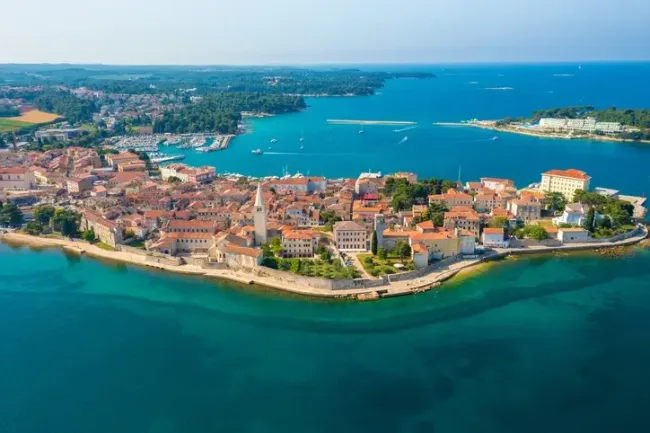
- Croatia Schengen Visa for United Arab Emirates citizens
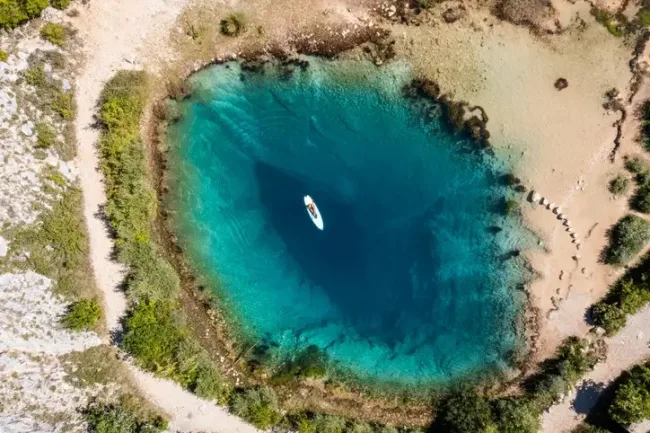
- Croatia Schengen Visa for Indian Citizens
What are iVisa's accreditations and recognitions?
When should i apply for the croatia schengen visa, how long does it take to apply for the croatia schengen visa form, what documents do i need to apply online for the croatia schengen visa form.
- A passport scan.
What documents do I need to bring to the Croatia Schengen Visa appointment?
- Your online application form. Completed, printed, and signed.
- Your receipt confirming the fee payment. This is emailed to you by one of our agents.
- Two identical photos, not older than 6 months, glued to your application form. Follow the Schengen standards to make sure they are 100% government-compliant.
- Fingerprints. Consider your Schengen Visa applications in the past 11 years. Except for children under 12.
- Passport. Less than 10 years old. Valid for 3 months after visa expiry with 2 blank pages.
- A cover letter explaining why you intend to visit Croatia.
- Detailed travel itinerary. Download our free template!
- Proof of your financial capability. Stamped/signed bank statements from the past 3 months that prove you have enough funds for each day you plan to stay in Croatia. This doesn't apply to kids traveling with grown-up family members.
- Accommodation confirmation and their contact information.
- Proof of return to your country, such as return or round-trip tickets.
- If a minor , you'll need parental consent.
- If visiting friends or family, a confirmed invitation letter with their ID or residence permit copy.
- If a student , a recent, signed, and dated, letter from the institution specifying your enrollment and a No Obligation Letter specifying that an applicant's current institution or employer has no objections to their plans to study or work abroad.
- If traveling for business , a confirmed invitation letter from the Croatian institution explaining the purpose of the trip. And, a 3-month business bank statement.
- For medical travel , a certificate from the institution confirming treatment availability and financial capability.
- Health insurance with coverage of at least €30,000 in the Schengen area.
Can I travel to all the Schengen countries with the Croatia Schengen Visa?
Can i get the croatia schengen visa for free.
Unfortunately not. There is a government fee you will need to pay.
You won’t need to pay the government fee if the applicant is under 6, a student, scholar, teacher, researcher, non-profit event participant under 25, attending international meetings in Croatia, a family member of Croatian citizens, invited by the government, a diplomatic and service passport holder, or a family member of EU, EEA, Swiss Confederation, or EFTA citizens.
How long is the Croatia Schengen Visa valid for?
Are there any covid-19 requirements to enter croatia, who can i talk to if i have more questions, where can i read more.
- Croatia Vaccination Requirements: Do I need a vaccine to travel to Croatia?
- Best time of year to visit Croatia and enjoy nice weather on your trip!
- Best cities to visit in Croatia: which one should I not miss?
- Things to do in Croatia: what are the best things to see there
- Croatia visa policy
Other Available Visas: Croatia?
- Croatia Digital Covid Certificate
- Croatia/Croatia Etias
- iVisa is NOT affiliated with any government agency. This site does not provide legal advice and we are not a law firm. None of our customer service representatives are lawyers and they also do not provide legal advice. We are a private, internet-based travel and immigration consultancy provider dedicated to helping individuals travel around the world. You may apply by yourself directly on the various government websites. The source of information: https://gov.hr/en/visas/1216

How not to blow a part of your travel budget on visas

- Rejection of visas can impact your travel costs, especially when you have to cancel flight and hotel bookings.
Three months ago, Mumbai-based Devanshi Ashar was getting ready for her much awaited holiday in Europe. Her travel destination and itinerary had been planned months in advance, and the flight tickets and hotels booked. Ashar’s employer had also approved her leave! And then, disaster struck. Her Schengen visa application for France was rejected. She reapplied, but it was rejected again. Ashar says the reason given by the French embassy for rejecting the visa was vague. “The rejection letter said the reason for my travel was not justified. I’m not sure what that even means. The purpose of a tourist visa is tourism, so what more reasons do they need?" said Ashar, a research analyst and content strategist.
The visa rejection not only wrecked her travel plans but also cost her about ₹ 47,000 in visa costs and agent fees as well as the charges for cancellation of flight tickets and hotel bookings. To add to her woes, the travel insurance was non-refundable. Ashar’s monetary loss was equal to what she had paid for the round-trip flight tickets.
Ashar is not the only person whose Schengen visa application has been rejected thus far. Data from Schengen Visa Info shows that about 18% of the total 671,928 applications for Schengen visa (including tourist and business visas) from India were rejected in 2022. That year, India had the third largest number of Schengen visa applications among 167 countries.
To be sure, visa rejections are not limited to Schengen states—an area encompassing 29 European countries that have officially abolished border controls at their mutual borders. The application process for most western countries, too, carry stringent entry restrictions and involve heavy and cumbersome paperwork. In 2023, about 10% of the total applications for US B-visas made by Indian citizens were rejected, as per data from The US Department of State. Moreover, tourist visas for the US also have seen tediously long waiting periods, which add to the travel woes of applicants. Currently, the slot for a US B2 visa is available only next year.
So, if you are gearing up to plan the perfect summer vacation overseas this upcoming season, you will need to carefully study the visa process involved before zeroing in on the country you want to visit.
Consider costs holistically
Visa fees for western countries are quite steep. For instance, Turkey demands the highest fee of ₹ 17,500 per traveller. US and UK are next in line, with ₹ 15,540 and ₹ 12,600 fee per person, respectively. Fees for most Schengen countries range between ₹ 6,500 and ₹ 7,500. There are other costs as well.
The total amount you pay to get a visa typically includes the visa fee charged by the respective country’s embassy, service fee charged by the Visa Application Centres (VACs), including the likes of VFS Global, BLS International or Gateway Visa Services, mandatory travel insurance and other ancillary expenses like appointment fee, convenience fee, passport courier service charges, etc.
For instance, the visa fee for France is ₹ 7,100. VFS Global, the visa outsourcing company that processes Schengen visas, charges a service fee of about ₹ 1,825 and a convenience fee of ₹ 150. The total visa process fee comes to at least ₹ 9,000 per adult. So, a family of four can expect to lose about ₹ 40,000 if the visas are rejected.
Optional services, like premium lounge, courier services, printing at the centre or collection of documents from home, among others, add to the total cost.
Moreover, most countries also ask for confirmed air tickets and hotel bookings as part of the visa application process. If you book a non-refundable ticket, you stand to lose the entire airfare in case of visa rejection. To protect against the risk of rejection, you can consider booking refundable tickets, which can cost 15-20% more. For instance, Ashar had paid 15% higher on refundable air tickets. So, she got a refund after the cancellation fees was deducted.
Take note that the convenience fee charged by a VAC is approved by respective governments.
“The VFS Global service fee is duly approved by governments as per contractual agreements. For example, in the case of Schengen countries, the service fee for short stay visas can go up to a maximum of €40 (approximately ₹ 3,500) as per the EU visa code regulation. The service fee is different for each country according to what governments approve," a VFS Global spokesperson said in an interaction with Mint.

Visa rejection risk and long waiting periods are typically prevalent where applications to Western countries are concerned. Experts advise that prospective travellers should plan in advance, especially in the case of Schengen visas because the peak travel season for Europe is approaching. “Slots for France, Spain, Netherlands and other countries—where the visa approval rates are higher and are available within a month— are filling up fast," said Priyesh Sharma, a travel consultant with expertise in Schengen and Canadian visas.
Yudhbir Singh, director-owner, Trimax International, a visa assistance provider, recommends that people apply for visas at least four months in advance. “The processing time across countries is not standard and can take about a month in some cases. Moreover, applying early for the visa will help as it will leave room to reapply in case of rejection or withdraw and apply again if there are delays," he said.
To increase approval chances, you should carefully read the instructions before your biometric appointment date and carry all the required documents. Going through an agent may help, especially for those who are short on time or are applying for the first time as these agents are aware of the reasons that lead to approvals or rejections and can clearly inform you on the hygiene practices to follow. “Small details like what to include in the cover letter or the minimum balance to show in the bank account can influence the approval chances," said Nikita Dresswala, founder, Teleport, a tech platform that simplifies visa applications.
Agents typically charge ₹ 500-5,000 for basic services like sorting the right documents, providing guidance on the cover letter, submitting the application at the embassy, etc. This small premium can help you save on the many ancillary charges that are slapped at the centre if one is not well informed. “People are typically anxious for Schengen and US visas as these involve a lot of paperwork. For instance, the UK may reject a visa request if the applicant’s bank account statements show sudden withdrawals or deposits. If we notice such activity while reviewing documents, we ask the applicant to explain such transactions in the cover letter so that it doesn’t affect visa approval," said Dresswala.
Sharma pointed out that some agents charge a higher premium of about ₹ 10,000-20,000 and get an early appointment slot. But, travellers should not confuse this with a guaranteed visa. “No agent can guarantee a visa, so don’t fall for that pitch and end up paying through your nose."
If your application gets rejected, Singh advises that the traveller must apply again. “Rejections don’t have a bearing on future applications as long as the rejection is not done on the account of fake documents and misleading information."
Look at easier options
Several countries, including Thailand, Kenya, Sri Lanka and Malaysia, have lately waived off visa fees for Indian citizens. In some cases, like in Kenya and Malaysia, you have to register online before travelling, and the application gets processed in one day, whereas for Mauritius, Maldives and Sri Lanka, you get free-of-cost visa-on-arrival. You may consider these countries to avoid the hassle of taxing visa processes and expensive fees.
Other countries that follow an entirely online visa process, like Singapore, Egypt and Indonesia, among others, are also good alternatives with cheaper visa fee and shorter processing period.
MINT SPECIALS
Wait for it….
Log in to our website to save your bookmarks. It'll just take a moment.
You are just one step away from creating your watchlist!
Oops! Looks like you have exceeded the limit to bookmark the image. Remove some to bookmark this image.
Your session has expired, please login again.
Congratulations!
You are now subscribed to our newsletters. In case you can’t find any email from our side, please check the spam folder.

Subscribe to continue
This is a subscriber only feature Subscribe Now to get daily updates on WhatsApp

What Is Schengen Travel Insurance?
Quick answer.
S chengen travel insurance is a specific type of travel insurance policy tailored to meet the travel medical coverage requirements set by the 27 (soon to be 29) European destinations within the Schengen Area. Travelers must present proof of sufficient coverage as part of the Schengen visa application process.
Schengen member countries have abolished their internal borders, allowing more accessible travel within the area. While this is incredibly convenient, some travelers may need a visa to visit Schengen countries. And one of the requirements to obtain that visa is to purchase sufficient travel medical insurance coverage.
Read on to learn more about Schengen visa travel insurance requirements and find the best travel insurance policy for your upcoming trip.
Table of contents
What is schengen travel insurance, schengen countries, visa and travel insurance requirements for the schengen area, key coverages in schengen travel insurance, how to get schengen travel insurance, schengen travel insurance faqs, summary of money’s guide to schengen travel insurance.
Schengen travel insurance is designed for travelers entering the Schengen zone, which comprises 27 (soon to be 29) European nations that have abolished internal borders.
Many visitors, including citizens from non-EU countries like India and China, must obtain a travel visa to enter the Schengen Area. And a requirement for a Schengen Visa is to have insurance covering at least €30,000 (around $32,720) in medical costs.
However, there are exemptions. For example, U.S. citizens and residents of countries such as Canada, Brazil and Mexico don’t need a Schengen visa or travel insurance for stays of up to 90 days within a 180-day period.
The Schengen Area consists of a diverse tapestry of countries. Among the member nations are some of the best places to visit in Europe , including France, Italy, Germany, Spain, Greece and the Netherlands.
Here’s the complete list:
Ireland and Cyprus are the only E.U. member states not currently part of the Schengen Agreement.
Having a valid U.S. passport allows you to spend up to 90 days within a 180-day period in the Schengen Area, whether for tourism or business purposes.
Once officially admitted, you can travel freely within the member countries without passing through customs each time. Stays under 90 days don’t require a visa for U.S. nationals, but your passport should be valid for at least six months past your travel dates.
Short stays don’t require travel medical insurance either, though travel insurance may still be worth it . That could be especially true if you plan to participate in adventure sports or other high-risk activities.
Travel insurance generally also covers cancellations and delays. Purchasing a policy could pay off if you’ve booked expensive, non-refundable flights or accommodations and didn’t purchase them with one of the best travel credit cards that offer insurance.
European Travel Information and Authorisation System (ETIAS)
Travel requirements for European Union countries are projected to change by mid-2025. Visa-exempt travelers to all 27 (soon to be 29) Schengen countries and Cyprus will need an ETIAS authorization.
Here’s what you need to know:
- You must complete an online application and pay a small fee for an ETIAS authorization.
- The authorization is tied to your passport and is valid for three years or until your passport expires.
- With a valid travel authorization, you can enter 30 European countries for short stays of up to 90 days within a 180-day period.
- ETIAS authorization does not guarantee entry into any of these countries. You still have to present your passport and documents at the border.
- The above applies to people from the U.S., Canada and dozens of other countries, so check the E.U.’s official travel website or your country’s embassy for more information. An ETIAS is not a visa and doesn’t mandate travel medical insurance.
Schengen visa requirements
You’ll need a visa if you’re from a visa-exempt country, like the U.S., and planning to stay in the Schengen Area beyond the 90-day threshold. Regardless of the length of the stay, nationals traveling from certain countries always require a visa.
Determine which Schengen country you’ll spend most of your time in and check with their official tourism or embassy website for instructions on applying for a visa. The embassy will inform you about the required documentation and instructions to meet their regulations.
Schengen visa processing time can vary depending on your country of origin and your destination country, so be sure to start the process as early as possible.
Besides the application form, the following are required to obtain a Schengen visa:
- Valid passport: Your passport must be valid for at least three months after departure.
- Passport photo: You must submit a picture of yourself that complies with the International Civil Aviation Organisation (ICAO) standards.
- Travel medical insurance: You must carry at least €30,000 (approximately $32,720) in coverage for medical emergencies, hospitalization and repatriation that’s valid in the entire Schengen Area for the duration of your stay.
- Documentation: You must provide evidence of the purpose of your visit through supporting documentation, demonstrate you have the financial means to cover expenses and accommodations and show intent to return to your home country after the stay.
- Fingerprints: Most, but not all, applicants will be required to submit their fingerprints along with their application.
Consulates of particular countries may require additional documentation.
Understanding what travel insurance covers can help you plan a worry-free journey. While plans and coverage options vary by company, here’s a breakdown of what Schengen travel insurance generally covers.
- Medical expenses: Travel medical insurance covers the cost of treating unexpected illnesses or injuries you suffer during your trip, up to your policy limits. These include the cost of medications, hospitalization and other essential medical treatments.
- Medical repatriation: Some travel medical policies also include emergency medical evacuation or repatriation, which covers some of the costs of transporting you back home or to a different medical facility to receive necessary medical treatment.
- Repatriation of remains: As the name suggests, this coverage will pay (up to your policy limits) for expenses related to transporting your body or cremated remains to your home country or point of origin.
- 24/7 Travel Assistance: Travel insurance companies generally offer round-the-clock assistance services, including language support, help recovering lost passports or prescriptions and even booking accommodations and medical transportation.
Note that some companies may require you to meet a deductible for the travel medical plan to start paying out.
Other travel-related coverage options
Most travel insurers sell policies covering medical emergencies and travel-related inconveniences such as delays, cancellations, lost luggage, and more. While you don’t need these coverage options to obtain a Schengen visa, you may still find them worthwhile.
- Trip cancellation and trip interruption: Covers non-refundable expenses if you need to cancel or cut your trip short due to unforeseen events like illness or accidents.
- Baggage loss or delay: Helps cover the cost of replacing essential items if your baggage is lost or delayed by a specified number of hours.
- Delayed flights and missed connections: Provides compensation for additional expenses caused by inconveniences such as delays or missed connections.
It’s easy to buy travel insurance for your Schengen Area trip. Many providers offer policies that fulfill the visa requirement and include additional coverage that can be tailored to your needs.
Here are some steps to help you get the right coverage.
1. Research reputable travel insurance providers
Most travel insurers bundle travel medical insurance coverage with trip cancellation, interruption, and other coverage options. If you only want to satisfy Schengen visa requirements, look for a provider that explicitly markets Schengen travel insurance or offers stand-alone travel medical coverage.
2. Select a plan that meets your needs and get a quote
Remember that you may not need trip insurance beyond the €30,000 in travel medical coverage required for a Schengen visa, so read plan details carefully to avoid buying unnecessary coverage.
It also pays to shop around and get quotes from several insurers, as travel insurance costs between 3% and 14% of the total cost of your trip, depending on the company and policy you choose.
3. Read your policy details
When shopping for travel insurance online, you’ll typically find that most companies include a policy summary or schedule. This document outlines critical details such as the policy’s coverage limits and exclusions. Carefully reading it can help you avoid surprises and frustration if you ever need to file a claim.
If you still have questions after reading the policy summary, contact the insurer before finalizing your purchase.
4. Get to know the claims process
Similarly, reading about your insurance provider’s claims process can save you time and energy in an emergency. Your policy summary should include a list of documents you’ll be required to provide as part of the claims process, which may include receipts and medical bills.
After a covered incident, contact your insurer through the company’s website or mobile app as soon as possible. Most insurers also offer travel assistance services around the clock.
5. Purchase and safeguard your policy
You will need proof of your travel medical insurance plan to apply for a Schengen visa. Keep your insurance certificate in a secure yet accessible location, whether a digital version on your smartphone or a physical printout in your travel folder.
It may also be a good idea to share a copy of your policy with a trusted friend or family member back home so they can contact your insurance provider if you cannot request medical assistance due to an emergency.
Should I get travel insurance for Europe?
Travel insurance, especially within the Schengen Area, is not just recommended but often mandatory. To obtain a visa to visit the Schengen zone, you must show proof of having sufficient travel medical insurance.
How much travel insurance do I need for Europe?
What countries does europe travel insurance cover.
- The first step before you travel to any Schengen country is to determine whether you need a visa and, therefore, mandatory travel medical insurance for a Schengen visa.
- Check with your country’s embassy, Department of Foreign Affairs or the tourism website of the country you plan to visit for specifics about medical travel insurance for Schengen visa requirements.
- You don’t need a visa or international travel insurance if you have a valid U.S. passport and are visiting the Schengen zone for less than 90 days in a 180-day period.
- If you’re a U.S. national planning to visit the Schengen Area for more than 90 days, you must apply for a visa and secure adequate travel health insurance (at least €30,000 in travel medical and repatriation coverage).
© Copyright 2024 Money Group, LLC . All Rights Reserved.
This article originally appeared on Money.com and may contain affiliate links for which Money receives compensation. Opinions expressed in this article are the author's alone, not those of a third-party entity, and have not been reviewed, approved, or otherwise endorsed. Offers may be subject to change without notice. For more information, read Money’s full disclaimer .

- mumbai News
Schengen visa delays hit summer vacation travel plans for Europe

Visual Stories


IMAGES
VIDEO
COMMENTS
The Croatia Schengen visa allows a short-term stay in Croatia. It's perfect for exploring stunning landscapes, rich cultural heritage, and vibrant cities. Whether it's for a holiday, business trip, or visit to friends and family, the Croatia Schengen visa offers a chance to experience all that this captivating country has to offer. Our visa experts […]
The visa regime of the Republic of Croatia is part of the EU acquis. As of 1 January 2023, Schengen visas (visas type A and C) and national long-term visas (visa type D) are issued in Croatian diplomatic missions and consular offices. The time spent in the Republic of Croatia is added to the time spent in other Member States of the Schengen ...
To enter Croatia with a Schengen visa, the visa must be valid for at least 15 days, starting from the date of arrival in Croatia. It must also be issued by one of the Schengen Area member states, and it must allow for multiple entries or the ability to travel to other Schengen Area member states. It's important to note that Croatia still ...
General Visa Requirements for Croatia. As of 1st January 2023, Croatia is part of the Schengen Zone, and visa requirements for Croatia fall in line with the rest of the Zone. Many foreign visitors do not require visas to enter the Schengen Zone; citizens of the U.K., EU countries, the U.S., Canada, Australia and New Zealand do not need visas to ...
No, if you already have a valid Schengen visa you do not need to get an additional Croatian visa if you want to visit Croatia as well. You can enter Croatia with your Schengen visa, provided the visa still has valid entries left as well as remaining days of stay. This also applies to holders of residence permits for a Schengen country.
The Schengen visa is a short-term visa that allows travellers to freely travel around 27 countries in the Schengen Area.Its most popular members include Italy, France, Greece, Spain, and Switzerland.. After the official announcement, checks on land and sea borders between Croatia and other Schengen countries will be lifted at the start of 2023.
Visa application is submitted at the embassy/consulate of the Schengen area Member State that is the main destination of the travel. If the main destination of the travel is Croatia, the visa application is submitted at the competent Croatian embassy/consulate or at VFS Global Visa Application Center. If there is no Croatian embassy/consulate ...
EU citizens don't need a visa for stays of any length, they don't even need a passport providing they have an ID card. The same applies to members of the European Free Trade Association (EFTA): Iceland, Liechtenstein, Norway and Switzerland, that means you. Many other nations don't need visas either, but from mid-2025 visitors to Croatia ...
How long can I stay in the Schengen area on the basis of my visa? The Schengen visa is a short stay visa and takes the form of a sticker affixed to the travel document. The definition of "short stay" is a stay of "90 days in any 180 days period". This means that the total duration of stay is of maximum 90 days, in any period of 180 days.
Do I need a Schengen visa to visit Croatia? Croatia has been one of the 27 members of the European Union since 2013. And on January 1, 2023, the republic also became the official 27th member of the Schengen area. So today, if you aren't a national of the Schengen area and/or the EU, you might need to have a Schengen visa to enter the country.
The Schengen visa is a common visa that allows travelers to visit most European countries within the Schengen Area. It is issued by one of the Schengen states and is valid for a specific duration of stay. Croatia, despite being a member of the European Union, is not yet a part of the Schengen Area.
Checks at internal air borders will be lifted from 26 March 2023.". Indian citizens were earlier required to apply for Croatia visa via VFS. The processing time was around 15 days and it costed 715 kuna (Rs7,928). A Schengen visa allows a person to stay in the Schengen area for up to 90 days over a period of 180 days.
Visa requirements. You can travel without a visa to the Schengen area (including Croatia) for up to 90 days in any 180-day period. This applies if you travel: as a tourist;
If you are a citizen of a country that is not part of the Schengen Area but holds a valid Schengen visa, you can also enter Croatia without an additional visa. You can stay in Croatia for a maximum of 90 days within a 180-day period, just like Schengen Area citizens. It's important to ensure that your Schengen visa is still valid and has enough ...
The documents you need to provide when entering the Schengen Area are as follows: Valid Passport. Issued within the previous 10 years and valid for at least 3 months after the date you intend to leave the EU. Schengen Visa. If you are a national of one of the third countries needing a visa. ETIAS Entry Authorization.
Additionally, having a Schengen visa can make it easier to travel to other countries that accept Schengen visa without the need for additional visas or paperwork. Our webpage is your guide to visa-free travel with a Schengen visa. Whether you're an experienced traveler or planning your first international trip, this will be a valuable resource ...
It depends on the type of Schengen visa you have: a two-entry or multiple-entry visa would exempt you from the visa requirement in Croatia, a single-entry visa does not. If you were a resident in the Schengen area (holding a national long-stay or "type D" visa or a residence permit), you would also be exempted from the visa requirement in ...
Yes, you can travel to Schengen countries with a Croatian visa. Yes, you can travel to Schengen countries with a Croatia visa. Croatia is a member of the European Union and part of the Schengen Area, so Croatian visa holders can freely travel to any Schengen country. If you're planning a trip to Europe, a Croatia visa is a great option.
The European Union has approved Croatia as the newest member of the border check-free Schengen zone from next month - allowing travellers to visit the country on a Schengen visa. The world's largest free travel zone, the Schengen area comprises 26 countries — 22 EU states plus Iceland, Liechtenstein, Norway and Switzerland. Almost 1.7 million people live in one Schengen country and work in ...
8. Update, January 2023: This answer is no longer correct as Croatia has joined the Schengen area in full. The original answer follows. No, you cannot. Unfortunately the Ministry of Foreign and European Affairs in Croatia clearly states that you need a multiple entry visa in order to do so. In line with the Government's decision, aliens who ...
You should be fine. Although Croatia is not part of the Schengen zone (legally bound to join, but not yet), it does allow vistors holding a Schengen visa without the need of an additional visa. Days spent in Croatia do not count towards the Schengen 90/180 rule. The Croatian Ministry of Foreign and European affairs tells us the following on ...
Considering Croatia joined a Schengen Area on January 1st 2023, Croatian visa will be Schengen visa unless stated otherwise on the visa sticker itself. Croatian visas issued before 01/01/2023 which are still valid will continue to be valid until their expiry but only for the territory of Croatia and cannot be used to travel to Schengen Area.
The Croatia Schengen visa, is a short-stay visa (visa type C), allowing you to either transit through or stay in the Schengen countries. Your visa is valid for 90 days within 180 days. We recommend applying 15 days to 6 months before your trip, with a maximum of 9 months for seafarers.
How not to blow a part of your travel budget on visas. Data from Schengen Visa Info shows that about 18% of the total 671,928 applications for Schengen visa from India were rejected in 2022. (REUTERS)
Many visitors, including citizens from non-EU countries like India and China, must obtain a travel visa to enter the Schengen Area. And a requirement for a Schengen Visa is to have insurance ...
While post-Covid revenge travel, especially to international destinations, continues to hit the roof, getting the Schengen visa has become a problem—especially for certain countries. Take the ...
Bulgaria is now applying new visa rules, as of March 31, when it joined the Schengen Area. Travellers holding short-term visas issued by Bulgaria before March 31, can still enter Bulgaria, Romania, and Cyprus, but not the rest of the Schengen Area countries. Third country nationals can now apply for a Bulgarian visa in 60 locations in nine ...